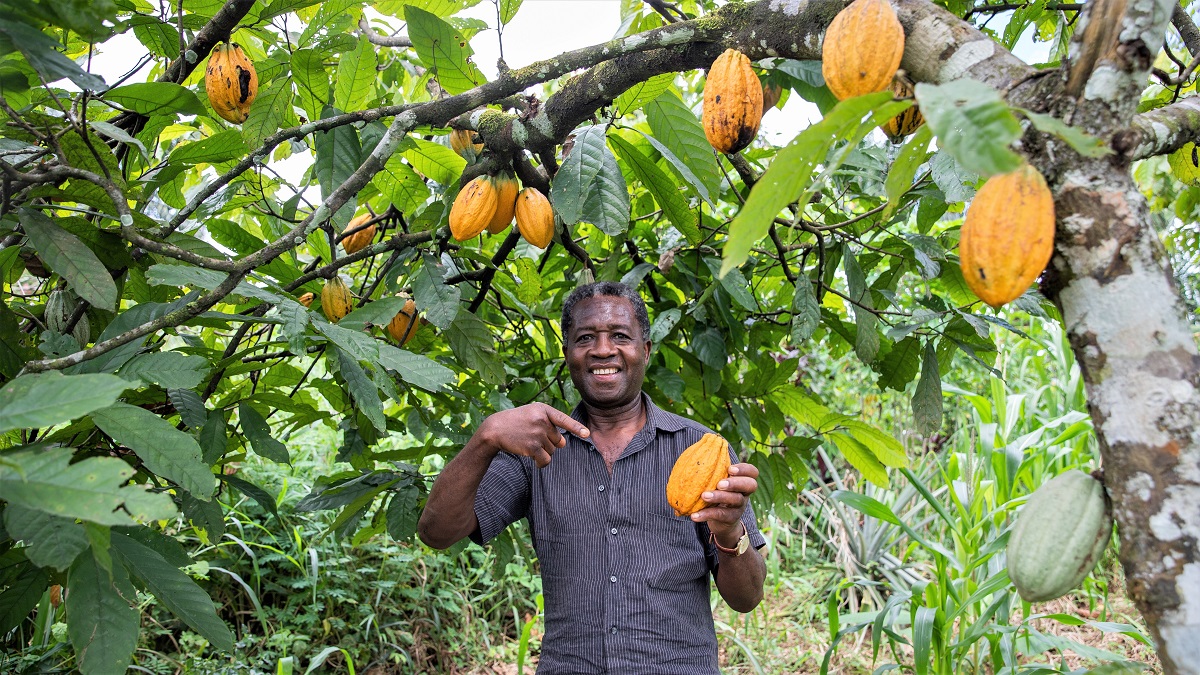
Ecolabels and sustainability certifications are supposed to make shopping your values easier. But there are so many competing systems, it’s hard to know who to trust. Even the biggest, most recognizable ecolabels have their controversies. And among the less-familiar labels, separating the small organizations with high standards from the corporate greenwashing schemes can take so much research you might as well track down the farmer and ask them directly. In fact, that might be the best solution. What if the greenest label is no label at all?
Direct Trade
Individual consumers can’t travel to Africa or Central America to buy their coffee or cacao beans directly from the farmer. But the roasters and chocolatiers that they buy from can. The small but growing direct trade movement is most common with luxury food products with long, obscure supply chains like coffee (popularized by Intelligentsia and Counter Culture) and chocolate.
There is a very small Direct Trade label focused on Latin America that certifies a handful of products. But in general, direct trade bypasses certification systems to establish direct relationships between the producer and processor. For example, nearly all tea is purchased in bulk by multinational corporations from huge plantations with known environmental and human rights offenses or buy from intermediaries that pool tea grown on smallholder farms under unknown conditions. Only a tiny handful of tea companies, such as Tea Rebellion, buy tea directly from farmers.
Advantages of Direct Trade
Just as shopping at a farmer’s market enables you to question the farmer about their product, direct trade gives consumers a closer link to the product’s origin. For example, coffee routinely passes through so many hands that as little as 10% of the retail price of your morning cup goes to the farmer. With direct trade, there is only one person between the farmer and you, allowing much more of the purchase price to go directly to the farmer. The farmer also gets to keep more of that money, since they don’t have to pay expensive certification fees.
Direct trade products like chocolate are rarely certified and may not even meet ecolabel standards. But ecolabels can only spot-check their farmers; a direct trade seller will have a personal relationship and first-hand knowledge of the farming practices of their growers. They work directly with the farmer in good faith to improve their methods, care for their workers, and sustain the land.
This leads to a potential third advantage – a better product. Direct trade allows small farmers with better products to individually negotiate better prices instead of receiving the standard price agreed by fair trade co-ops. This incentivizes small farmers to prioritize quality over volume.
Direct Trade Downsides
Direct trade has some inherent drawbacks. First, you need to do your own research to find a direct trade source. You have to interrogate each potential supplier to find out how the product is grown, how much they pay the farmer, and how often they visit to confirm that practices haven’t changed. And ultimately, you have to take a leap of faith. With no third-party certification, the only guarantee that a direct trade roaster isn’t just rebagging beans they bought from an importer is their word.
There is no official definition for direct trade. For a highly processed product like coffee, it can be hard to define. Purists say it is only direct trade if the roaster buys from the farmer, handling intermediate steps themselves. But roasters who buy from coffee mills, and importers who buy directly from farmers also often market their coffee as fair trade. And though direct trade has the potential to improve quality, if coffee deliveries are prepaid or contracts guarantee a sale, the roaster has no option to reject a substandard product.
Buyer Beware
Direct trade allows consumers to choose their own sustainable standards. But it requires significant effort and trust on the part of everyone involved. Depending on your perspective, this is either its greatest strength or weakness. Direct trade is not possible for every product. And it is certainly not for everybody. But when it works, it can be the greenest choice. Ultimately, though, every purchase is an act of trust. That’s true whether you are trusting your local coffee roaster, an online retailer, or a third-party certification system.
"direct" - Google News
July 05, 2021 at 04:09PM
https://ift.tt/2TzQdqh
Direct Trade Takes Consumers to the Source - Earth911.com
"direct" - Google News
https://ift.tt/2zVRL3T
https://ift.tt/2VUOqKG
Direct
Bagikan Berita Ini














0 Response to "Direct Trade Takes Consumers to the Source - Earth911.com"
Post a Comment